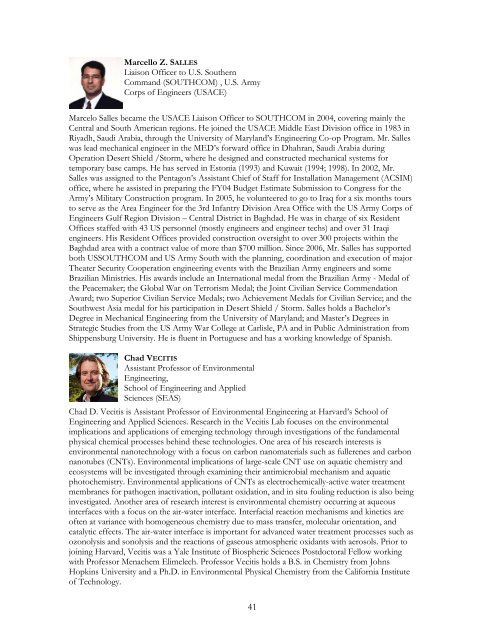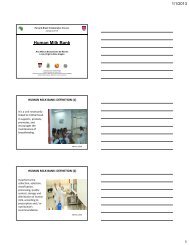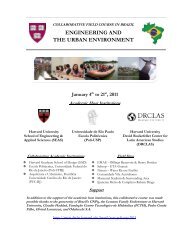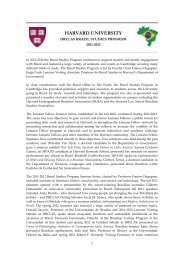Harvard - DRCLAS Brazil Office - David Rockefeller Center for Latin ...
Harvard - DRCLAS Brazil Office - David Rockefeller Center for Latin ...
Harvard - DRCLAS Brazil Office - David Rockefeller Center for Latin ...
Create successful ePaper yourself
Turn your PDF publications into a flip-book with our unique Google optimized e-Paper software.
Marcello Z. SALLES<br />
Liaison <strong>Office</strong>r to U.S. Southern<br />
Command (SOUTHCOM) , U.S. Army<br />
Corps of Engineers (USACE)<br />
Marcelo Salles became the USACE Liaison <strong>Office</strong>r to SOUTHCOM in 2004, covering mainly the<br />
Central and South American regions. He joined the USACE Middle East Division office in 1983 in<br />
Riyadh, Saudi Arabia, through the University of Maryland’s Engineering Co-op Program. Mr. Salles<br />
was lead mechanical engineer in the MED’s <strong>for</strong>ward office in Dhahran, Saudi Arabia during<br />
Operation Desert Shield /Storm, where he designed and constructed mechanical systems <strong>for</strong><br />
temporary base camps. He has served in Estonia (1993) and Kuwait (1994; 1998). In 2002, Mr.<br />
Salles was assigned to the Pentagon’s Assistant Chief of Staff <strong>for</strong> Installation Management (ACSIM)<br />
office, where he assisted in preparing the FY04 Budget Estimate Submission to Congress <strong>for</strong> the<br />
Army’s Military Construction program. In 2005, he volunteered to go to Iraq <strong>for</strong> a six months tours<br />
to serve as the Area Engineer <strong>for</strong> the 3rd Infantry Division Area <strong>Office</strong> with the US Army Corps of<br />
Engineers Gulf Region Division – Central District in Baghdad. He was in charge of six Resident<br />
<strong>Office</strong>s staffed with 43 US personnel (mostly engineers and engineer techs) and over 31 Iraqi<br />
engineers. His Resident <strong>Office</strong>s provided construction oversight to over 300 projects within the<br />
Baghdad area with a contract value of more than $700 million. Since 2006, Mr. Salles has supported<br />
both USSOUTHCOM and US Army South with the planning, coordination and execution of major<br />
Theater Security Cooperation engineering events with the <strong>Brazil</strong>ian Army engineers and some<br />
<strong>Brazil</strong>ian Ministries. His awards include an International medal from the <strong>Brazil</strong>ian Army - Medal of<br />
the Peacemaker; the Global War on Terrorism Medal; the Joint Civilian Service Commendation<br />
Award; two Superior Civilian Service Medals; two Achievement Medals <strong>for</strong> Civilian Service; and the<br />
Southwest Asia medal <strong>for</strong> his participation in Desert Shield / Storm. Salles holds a Bachelor’s<br />
Degree in Mechanical Engineering from the University of Maryland; and Master’s Degrees in<br />
Strategic Studies from the US Army War College at Carlisle, PA and in Public Administration from<br />
Shippensburg University. He is fluent in Portuguese and has a working knowledge of Spanish.<br />
Chad VECITIS<br />
Assistant Professor of Environmental<br />
Engineering,<br />
School of Engineering and Applied<br />
Sciences (SEAS)<br />
Chad D. Vecitis is Assistant Professor of Environmental Engineering at <strong>Harvard</strong>’s School of<br />
Engineering and Applied Sciences. Research in the Vecitis Lab focuses on the environmental<br />
implications and applications of emerging technology through investigations of the fundamental<br />
physical chemical processes behind these technologies. One area of his research interests is<br />
environmental nanotechnology with a focus on carbon nanomaterials such as fullerenes and carbon<br />
nanotubes (CNTs). Environmental implications of large-scale CNT use on aquatic chemistry and<br />
ecosystems will be investigated through examining their antimicrobial mechanism and aquatic<br />
photochemistry. Environmental applications of CNTs as electrochemically-active water treatment<br />
membranes <strong>for</strong> pathogen inactivation, pollutant oxidation, and in situ fouling reduction is also being<br />
investigated. Another area of research interest is environmental chemistry occurring at aqueous<br />
interfaces with a focus on the air-water interface. Interfacial reaction mechanisms and kinetics are<br />
often at variance with homogeneous chemistry due to mass transfer, molecular orientation, and<br />
catalytic effects. The air-water interface is important <strong>for</strong> advanced water treatment processes such as<br />
ozonolysis and sonolysis and the reactions of gaseous atmospheric oxidants with aerosols. Prior to<br />
joining <strong>Harvard</strong>, Vecitis was a Yale Institute of Biospheric Sciences Postdoctoral Fellow working<br />
with Professor Menachem Elimelech. Professor Vecitis holds a B.S. in Chemistry from Johns<br />
Hopkins University and a Ph.D. in Environmental Physical Chemistry from the Cali<strong>for</strong>nia Institute<br />
of Technology.<br />
41











